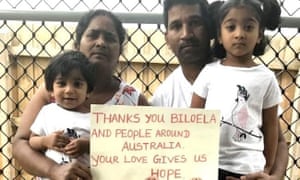One phrase has been repeated often during efforts to deport Priya,
Nades and daughters Tharnicaa and Topika: ‘the cruelty is the point’
“On
a personal level I couldn’t understand why – after so much documenting
of how horrific that split had been in the predawn raid – I thought
surely they wouldn’t do this again. Surely they’ll do this in a way
that’s not traumatic. But the department dialled it right back up again.
I find that completely impossible to metabolise.”
Over the last year, the freelance journalist Rebekah Holt has regularly visited two families in Melbourne immigration detention. This week one of those families – Priya and Nades, and their two daughters, Tharnicaa and Topika – has been the focus of an extraordinary amount of community grief, anger, and support, after the Australian government attempted to deport them to Sri Lanka.
At 7.43pm last Thursday, Holt received a video call.
“All I could see was them surrounded by guards, and a guard reading out the deportation notice,” she says.Over the last year, the freelance journalist Rebekah Holt has regularly visited two families in Melbourne immigration detention. This week one of those families – Priya and Nades, and their two daughters, Tharnicaa and Topika – has been the focus of an extraordinary amount of community grief, anger, and support, after the Australian government attempted to deport them to Sri Lanka.
At 7.43pm last Thursday, Holt received a video call.
“I was watching for 20 or 30 seconds and we were cut off, and that’s when I rang [the family’s lawyer] Carina Ford and told her it was happening, but she hadn’t been given any of the paperwork, hadn’t been told it was happening.”
Other asylum seekers called Holt and told her they couldn’t get to see the family.
They were separated into different vans, Priya and Nades each called Holt to tell her where they were, as they were driven to a waiting plane.
“Priya was obviously fighting with every fibre of her being not to be dragged on the plane, because she had an idea an injunction was imminent,” says Holt.
“She was giving it everything she had. But then once she was on the plane, they didn’t put her with her husband and her children.”
One phrase has been repeated a lot this week by supporters is “the cruelty is the point”.
It seems to be the only plausible explanation for an inexplicably arduous ordeal for a family who were exercising their legal rights – however futile that might have been.
Priya and Nades, and Tharnicaa, have collectively exhausted all legal avenues to appeal an original decision – they are not refugees and have no claim for protection in Australia. Kopika’s case is the only reason they are still here and will be next heard on Wednesday.
Even if they are returned to Sri Lanka, many supporters are asking why a beloved family with two toddlers were treated the way they have been.
Over more than five years, Priya and Nades, who arrived separately but met and married in Australia, have built a life while arguing their case and waiting for outcomes.
Australia’s highest court has ruled against them. The most powerful government ministers have refused to intervene.
In March 2018 Priya’s last bridging visa expired. They didn’t flee. There was no sense they would flee. But in a pre-dawn raid border force and Serco officers grabbed the family from their quiet Queensland town home, and put them in detention.
“It was very distressing for those of us who knew them on a social level,” says the Biloela resident and family friend Bronwyn Dendle.
“It was also very distressing for these agencies working with them, because there was no warning, there was no opportunity for the agencies to prepare them.
“There was no opportunity for us, their friends, to say goodbye. Which was really hard for the kids. My youngest son, Harry, kept asking: why is Kopika in jail?”
The quiet Queensland town of Biloela rose up, in what is now a well-documented community campaign to keep the family here. It fell on deaf ears.
“They could have kept them in Biloela while they did everybody’s legals,” Holt says. “They drag them from one place to another, keep them in a place that’s extremely unfit for infants and children to be kept in – Tharnicaa’s entire health issues demonstrate that – and then not show any duty of care in the way they then take them from that environment.”
The girls have suffered medical and behavioural issues associated with their detention along with its micro-cruelties like the denial of a friend’s attempt to bring in a birthday cake.
Over the course of their time in detention, however, there has been one point of light. Huyen, a young Vietnamese woman, and her daughter, Isabella – born in detention – have become family.
Originally the two families were kept separated, something Holt calls “illogical and heartbreaking nonsensical”, until eventually centre operators allowed the families and children to socialise.
“[Isabella] is incredibly close to the girls, they’re like siblings,” Holt says.
“Kopika and Tharnicaa are incredibly close to Huyen as well – I’ve got clips of them calling her aunty. That bond between them all, what they could do to support each other … At that stage there was no formalised access to playgroups, parenting groups, mothers groups.”
Isabella and Huyen, like the town of Biloela, have become collateral damage in the government’s treatment of the Sri Lankan family. Given long enough to form bonds and build lives, they weren’t given time to say goodbye.
“Isabella is crying, she’s looking for them,” Holt says. “Because they’ve been a part of her entire life. And she can’t find them. There is no explaining that to an 18 month old.”
“When you’re dealing with traumatised people there’s no reason to make it worse. I’ve got no idea why they did that.”

No comments:
Post a Comment